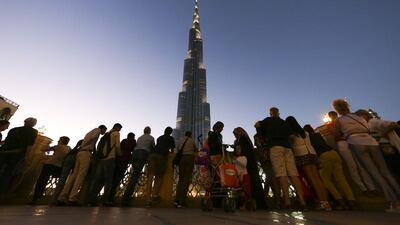Despite continued volatility in oil prices and continuing turmoil in countries ranging from Syria and Iraq to Libya, along with terrorist attacks in Tunisia and an insurgency in Yemen that prompted a Saudi Arabia-led military intervention, Middle East and North Africa bonds continued, in the first quarter, to be supported by the inherent strengths of core GCC countries.
These include huge currency reserves, the absence of currency risk, and strong non-oil growth.
Over the past quarter, significant progress was made in restructuring US$14.6 billion of debts accumulated by Dubai World, which should allow banks in the UAE to reclassify their loans to Dubai World from “nonperforming” to “performing”.
Visitor numbers to Dubai remained healthy, but a rash of hotel building meant that room occupancy rates have tended to fall, while the purchasing manager index’s (PMI) reading for February — although still a robust 58.1 (figures above 50 point to expansion) — was lower than in January.
Nevertheless, given the headwinds of the stronger dollar and weak oil market, the PMI figure is still quite impressive. PMI readings for Saudi Arabia were also strong, rising to 58.5 in February from 57.8 in January, thanks to a supplementary spending programme of $29bn (over 4.25 per cent of GDP) announced after King Salman acceded to the throne in late January.
The extra spending, including a boost to wages, has been reflected in higher retail spending and bank deposits. King Salman affirmed his commitment to policies of the late King Abdullah aimed at boosting health and education and improving employment opportunities for Saudi youth.
In Qatar, authorities confirmed that $200bn would indeed be spent on major projects ahead of the 2022 Fifa World Cup in spite of the drop in hydrocarbon prices. Kuwait announced plans to spend $115bn in investment projects over the next five years and promised a streamlining of the decision-making process, which has dogged spending plans in the past.
The outperformance of GCC bonds relative to global and emerging government bonds in a quarter characterised by volatile US Treasury yield movements, geopolitical concerns and weak oil prices is testament to the value and diversity that GCC bonds offer.
An important consideration is how a number of factors seen as detrimental to fixed income performance elsewhere tend to offset each other in the GCC. For instance, an increase in spreads because of rising geopolitical concerns tends to be compensated by gains owing to the decline in benchmark yields that coincides with these concerns, while at the same time, stability is afforded by GCC countries’ currency peg to the US dollar. We recognise that the geopolitical situation remains volatile and fluid in many parts of the Mena region.
As for oil prices, the possible lifting of sanctions on Iranian oil exports is likely to limit any large-scale recovery for the moment. But at the same time we also believe that fears that the Yemeni insurgency could spill over into Saudi Arabia are exaggerated and that conflicts in Libya, Syria and Iraq should continue to be contained.
Improving relations between Iran and the West is a positive development for the Mena region in the long term, and of clearer signs the global economy is firmly on a sustainable growth path should help to steady oil prices as time goes on.
Meanwhile, Egypt, the most populous country in the region, is making tremendous progress towards economic and social sustainability while the inherent strengths of core GCC countries remain intact.
Although abundant global liquidity is an important factor, we believe the intrinsic strengths of GCC countries and issuers help to explain why spreads on GCC corporate bonds have performed well.
While the trend towards higher public spending in the GCC could possibly lead to some short-term widening in spreads in the context of growing volatility in global fixed income markets, we continue to believe that countries such as Saudi Arabia and the UAE have accumulated sufficiently large reserves to ensure sustained growth and the continuing diversification of their economies.
More importantly, the development of regional fixed income markets continues to provide investment opportunities that could actually benefit from the current economic environment.
Mohieddine Kronfol is the chief investment officer, global sukuk and Mena fixed income at Franklin Templeton Investments Middle East

